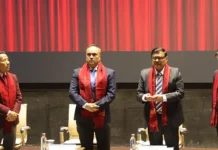[ Techi Tuyo ]
Tribal communities were earlier studied through the lens of the ‘other culture’, and the term ‘tribe’ itself carried colonial connotations. However, over the years, there has been a global academic shift toward reexamining and rewriting these narratives, placing tribal voices at the centre and recognizing indigenous knowledge systems, worldviews, cultures, folkloresand languages.
In this context, India has also witnessed a growing recognition of its indigenous communities. Efforts to engage with tribal knowledge, cultural perspectives, and languages have led to the formal establishment of tribal studies as a distinct academic discipline in several central and state universities offering MA in tribal studies. Institutions such as Indira Gandhi National Tribal University (IGNTU), Amarkantak, Manipur University, Mizoram University, Assam University (Diphu campus), Dravidian University (Andhra Pradesh), University of Delhi, and many more offer such courses.
In Arunachal Pradesh, two premier institutions – Rajiv Gandhi University in Rono Hills, Doimukh, and the Arunachal Pradesh University in Pasighat – offer MA in tribal studies.
This programme aims to provide students with a deeper understanding of tribes. The creation of these courses was a step towards empowering tribal voices and placing their concerns at the centre of research and policymaking. However, despite the establishment of tribal studies as an academic field, the treatment of its graduates reveals a troubling gap between academic recognition and institutional practice.
A discriminatory clause at home
According to the UGC, the eligibility criterion for the post of assistant professor is “a master’s degree with 55% marks (or an equivalent grade in a point-scale wherever the grading system is followed) in the concerned discipline from an Indian university, or an equivalent degree from an accredited foreign university.”
However, a recent teaching recruitment notification from the Arunachal Pradesh University, Pasighat, has raised serious concerns. The only state university, which offers MA in tribal studies, failed to recognize the very degree it confers while advertising the position of assistant professor in tribal studies.
The university issued an advertisement (No APU/34-ADVT/23/4860/11, dated 17 July, 2025). The eligibility criterion for the faculty recruitment,particularly for the post of assistant professor, Clause (03/A) of the advertisement mentions: “A master’s degree with 55% marks (or an equivalent grade in a point-scale wherever the grading system is followed) in the concerned discipline for all subjects or allied/relevant disciplines for tribal studies from an Indian university, or an equivalent degree from an accredited foreign university.”
Allowing allied/relevant subjects as eligibility criterion for the post of assistant professor in tribal studies while requiring subject-specific qualifications for other disciplines places students pursuing a master’s in tribal studies at a significant disadvantage. This not only dilutes the legitimacy of tribal studies as an independent academic field but also directly disadvantages students of tribal studies.While graduates from other disciplines may appear for the said post in tribal studies, the postgraduates in tribal studies cannot appear in other disciplines. This clause creates serious inconsistency and academic discrimination.
Such unfair academic discrimination posits serious question: If the institutions that offer tribal studies do not fully recognize its academic credibility during recruitment, what future do tribal studies postgraduates have?
Systemic neglect and academic injustice
Despite the growing academic recognition of tribal studies, its graduates continue to face significant challenges. Many hold postgraduate degrees in tribal studies and have qualified the National Eligibility Test (NET), which makes them eligible for teaching positions, particularly as assistant professor. However, inconsistencies in recruitment policies like accepting candidates from ‘allied’ disciplines while sidelining those with specialized degrees have resulted in the continued marginalization of tribal studies graduates.
Although the subject has evolved in both form and structure, employment avenues remain narrow, and institutional support is limited. As a result, graduates often find themselves in a limbo; qualified, yet facing a bleak future due to a lack of opportunities and recognition.
One tribal studies postgraduate student shared: “We studied tribal studies, thinking we would bring indigenous voices in the academic discourse and policies; now we find that our own degree is treated as optional – even for teaching the subject itself.”
This systemic neglect is not just a professional barrier; it is deeply discouraging. With little to no career prospects, many potential students are now hesitant to pursue tribal studies, and many have also discontinued the course, threatening the growth and sustainability of the discipline itself.
Recognizing tribal studies: From inclusion to implementation
Tribal studies is no longer in its formative stage. The institutional growth of the discipline across various central and state universities reflects its established academic standing. However, unless universities translate this recognition into fair and consistent recruitment process, graduates of tribal studies will continue to face discrimination and limited professional opportunities.
Students who choose to study tribal studies do so with passion and purpose. They aspire to serve their communities, conduct meaningful research, teach, or engage in policymaking. Unfortunately, many now find that their specialized degree is not considered sufficient. It is a clear case of academic discrimination. If tribal studies is offered as a full-fledged academic discipline, its graduates must be afforded the same respect, recognition, and opportunities as those from any other field.
Therefore, it is imperative that Arunachal Pradesh University, Pasighat apply the UGC guidelines uniformly. Just as other disciplines require a master’s degree in the specific subject for eligibility, the same standard must be upheld for tribal studies, creating equal opportunities for all the disciplines.
India, particularly Arunachal, a tribal state, has taken an important step by creating tribal studies programmes in two of its prestigious universities. But that step is meaningless if the system itself doesn’t recognize or value the students it produces. If we want to support tribal communities, we must start by supporting the people who study and represent them. This includes hiring tribal studies postgraduates to teach the subject they trained for. Anything less is not just unfair – it’s academic discrimination. (The contributor is an MA 3rd semester student at the Arunachal Institute of Tribal Studies, RGU, Rono Hills)


